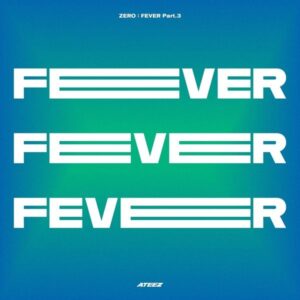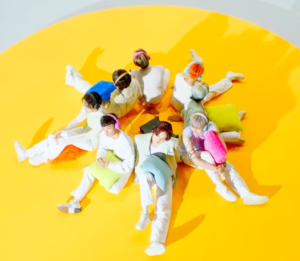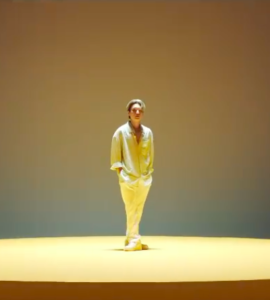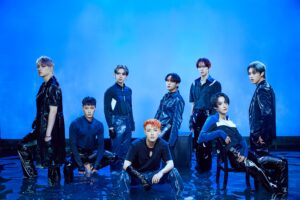
Never letting up on the image they have carved as beasts of performance, Ateez haven’t been taking things easy. Collaborations with Kim Jong-kook and Pentatonix, multiple successful appearances on Immortal Songs: Singing the Legend, and their run on Kingdom: Legendary War have all contributed to their ever-growing status. Bombast, sensuality and impressive choreography have become synonymous with the group, and these traits have all had their chance to shine in their most recent Fever series.
After a strong and confident opening in Part. 1 and a shakier Part. 2, ZERO: Fever Part. 3 arrives in a more pensive mood. Continuing the themes of striving for your dreams and the journey to success from the first two parts, here we see Ateez asking exactly what lies at the end of the road towards your goals. The answers have an ambiguity that is interesting, though unfortunately this intrigue comes mainly through the lyrics, rather than the music or arrangement.
The group, complete with Mingi, who has returned from his hiatus, once again opened up the choice of the album’s title track to fans. The choice, inevitably, was between the light of “Eternal Sunshine” and the dark of “Deja Vu”, with the dark concept, perhaps unsurprisingly in the current K-pop climate, winning out.
“Deja Vu” certainly rings out as the most musically distinctive track on the album, a good call by the fans. A sing-song, rippling little melody flows throughout, with a slightly calmer rhythm than might normally be found in such a performance, hype heavy group. The tropical beat of the chorus is a fun one to play with, especially after the far more typical military-style drum rolls of the pre-chorus.
However, there is something lacking here, a sense of edge or creativity that normally pushes Ateez to heights like “Say My Name” or “Wonderland”. The rhythm, while intriguingly relaxed, is not captivating in the same way as the latter’s sea-shantyesque swagger. It seems as though the aim here was minimalism, a kind of calm acceptance of their status after the braggadocio of earlier Fever tracks like “Firework”. But, without a real distinction in the music to really push this, the title track ends up underwhelming slightly.

A lack of creativity in musical style is also the case in “Eternal Sunshine”. Everything here is pleasant, from the light synths bobbing along to the vocal talents of the members. In a light, summery song like this, it’s natural that the rappers hold back from the full throttle shouts we hear in “Deja Vu” (and later “Rocky”), and even Jongho doesn’t let the full effect of his voice loose.
The following track, “Feeling Like I Do”, treads a similar path, though it is even more generic and hard to distinguish as interesting. But again, when we’ve seen that Ateez can give us something different from their light-hearted summer vibes (hello “Wave”), there is a question here of where that creativity has been channelled here.
The best answer to this: it’s gone into the lyrical concepts. In these two examples, the titles alone hint at a complex interplay between relationship, memory and cognition. “Eternal Sunshine” nods to the film depicting characters wiping entire sections of their memory, while the concept of ‘déjà vu’ clearly references the feeling of finding familiarity in the unknown. Both songs bare these underlying ideas out, with “Deja Vu” even tying it back to the themes of Part. 1’s “Inception”:
Are you, in front of my eyes, a dream
Reality or illusion
It feels as if I just had a dream in a dream
Oh it’s like the shivers of my body
Remembers you
I know you get déjà vu
This recognition, leading to a questioning of reality, is followed by a kind of surrender to the intense feeling it brings:
I go insane
The moment we met each other’s eyes
I couldn’t stop
I feel an endless thirst

Here it seems as though Ateez are renegotiating their perspectives in relation to reality and dreaming, framing both as inferior to feeling and emotion.
“Eternal Sunshine” takes this idea further, constructing a notion of personal eternity that is subjective rather than objective. Lyrics about constructing their own ideal scenery, combined with references to the world-bending eponymous movie, the eternal geometric shape the Möbius strip, and the sentimental Korean romance Christmas in August (two lovers find each other as one of them is dying, solidifying their love in time), emphasise this.
Hoping this scenery is beautiful
Just whisper, if you want to know it
I’ll promise you, I’ll get you a star
The place you’ve been dreaming for is in front of you
Time, reality and love become intertwined in a highly personal way throughout these songs, which is particularly pertinent as they sit at the end of a trilogy. For the ideas in these two tracks to reach such a transcendent and subjective point is a clever way to take the journey of the last two tracks. The more toned-down style of “Deja Vu” could be seen to be allowing these ideas more room to breathe, but, given Ateez’s pedigree in pushing the K-pop envelope, a more left-field approach may have suited the concepts at play better.

The album’s final tracks, “All About You” and “Not Too Late”, also attempt more considered responses to the question of what dreams Ateez are striving for, and whether they have found them. “All About You” finds the answer in a romantic figure, an unoriginal answer but one that is sweetly accomplished. Neat metaphors of space travel (“In your vast arms/
Searching for our planets) combine with gently dotting synths and, again, a slower rhythm, to imply that the scale of their journey maybe cosmic, though maybe only in an emotional, and thus romantic, sense. It’s endearing, but again the production offers little that musically emphasises these ideas.
“Not Too Late” is the closest to the traditional end-of-album ballad of all the tracks (well, it is at the end I guess), though here the rhythm is actually faster than normal for that particular genre. The instrumentation seems afraid to try anything interesting at all, and even the vocals, normally so potentially powerful, feel muted. Once more, this feels like a musical submission to more complex lyrical ideas. The song genuinely wrestles with the question of whether or not to give up on ambition, coming to different conclusions across verses and even across lines.
Everything will be fine, everything will be fine
On behalf of an uncertain echoing lullaby

This is a bold note to end this trilogy on: rather than a confident push forward, or statement of ‘mission accomplished’, Ateez expose their vulnerability and doubts over their journey’s purpose. Lyrically, it’s a strong idea to play with, but it isn’t echoed at all in the musical arrangement or production.
Where production does come out to play most clearly, aside from “Deja Vu”, is in “Rocky”. Another film nod, the key motif here is in comparisons to the film of the same name’s tireless, yet ultimately defeated, boxing star (sorry for the spoilers there).
The metaphor is a little too simple here, and the song’s brash sound doesn’t really challenge it. Fierce brass blasts sit under the main melody, and the vocals are closer to the grandiose confidence of Ateez’s strongest work. “Rocky” is the opposite of the title tracks and softer songs: the music is bolder, but the underlying message is shallow.

Ultimately that seems to be the central tension of Fever: Part. 3. The exciting concepts that get their spotlight through the lyrics of the songs do not seem to bleed through to the music itself. If you listen to this album casually, no thought to exploring further, you might even find it underwhelming.
It’s odd to see from a group who have played so well with their ideas across all elements of their music in the past, though that isn’t to say that this makes the album. It is certainly mature to take a more pensive approach to the end of this particular journey. But with concepts like the nature of eternity and the significance of memory floating around in the lyrics, it is slightly disappointing to miss a mind-bending creativity in the music alongside it.


